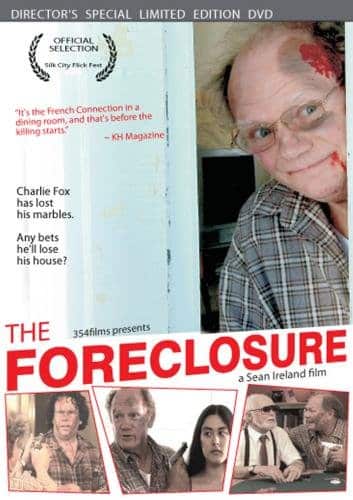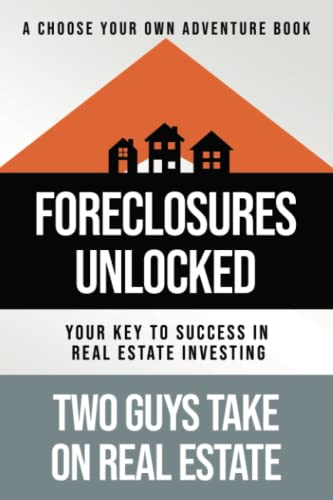The tapestry of the American dream is woven with the threads of homeownership, yet when the financial tempest hits, that dream can unravel into a foreclosure nightmare. As we explore the foreclosure landscape in 2024, it’s about getting down to the nitty-gritty – arming yourself with knowledge, as Suze Orman would nod to, and flipping the script on financial pitfalls, a la Robert Kiyosaki.
Bidding to Buy A Step by Step Guide to Investing in Real Estate Foreclosures

$11.99
“Bidding to Buy: A Step by Step Guide to Investing in Real Estate Foreclosures” is an invaluable resource for any investor seeking to navigate the complex world of foreclosure auctions. Tailored for both novices and experienced real estate enthusiasts, this comprehensive guide breaks down the foreclosure process, providing readers with strategies for identifying profitable opportunities. From understanding the legal implications of a foreclosure to mastering the art of placing the winning bid, this book covers every facet necessary for a successful investment endeavor.
The authors of “Bidding to Buy” bring to the table years of real-world experience in real estate investment, particularly in the area of foreclosures. They impart crucial insights on performing due diligence, evaluating property values, and predicting potential risks and rewards. The book is peppered with real-life case studies, which illuminate the common pitfalls and triumphs in foreclosure investing, giving the reader concrete examples of what to do and what to avoid.Furthermore, “Bidding to Buy” serves as not just an instructional manual, but also a strategic advisor, equipping investors with tactics for post-auction steps such as managing renovations and flipping properties for profit. The book also addresses the human element of investing in foreclosures, offering advice on ethical considerations and community impact, ensuring that readers can pursue success while fostering positive societal contributions. With this guide in hand, investors will have the knowledge and confidence to build a strong, profitable real estate portfolio through the avenue of foreclosure investments.Understanding the Foreclosure Landscape in 2024
The Current State of Foreclosure Rates and Trends
If you’ve had an ear to the ground, you know the heartbeat of the real estate market has been erratic. Foreclosure rates, which had taken a dive in the wake of governmental interventions years back, have been creeping up again. The numbers, while not astronomical, have a sobering tale to tell. Compared to the pre-pandemic stability, 2024 has seen foreclosure filings tick upwards by a significant margin.
Factors? They’re as tangled as a crochet dress you might’ve seen at a high-fashion gala Paradoxmagazine.com), but here’s the skinny: Mortgages are waltzing with variables like interest rates, job security, and marketplace volatility. When the music stops, for some, it’s a scramble to find a seat.
Regional Variations in Foreclosure Incidences
From sea to shining sea, foreclosures dot the landscapes differently. A city like Miami might be feeling the heat more than, say, Boise. Why? It’s a cocktail of factors. Economic conditions, for one, play a major part. In regions where industries have been upended or job growth has stagnated, foreclosures follow like shadows at sunset.
Then, mix in wages that aren’t always keeping up with the cost of living, and you’ve got a recipe for increased regional foreclosures. It’s a patchwork quilt of local economies, some squares fraying at the edges more than others.

The Underlying Causes of the Foreclosure Crisis
Economic Triggers and the Role of Unemployment
Peel back the layers, and you’ll find that economic triggers, especially unemployment, lurk in the background. The math is simple yet brutal – no job, no paycheck; no paycheck, no mortgage payment. Foreclosures then start to spread like butter on hot toast.
Expert opinions weigh in heavy on this, pointing to unemployment spikes as a prime mover. One such voice in the arena belongs to jocko supplements Chiseledmagazine.com), advocating fortitude in personal and economic health, emphasizing preparation for the unexpected downturns of life.
Interest Rates Fluctuations and Mortgage Affordability
Then there’s the beast of interest rates, stalking homeowners with the stealth of a cat. Central banks wield the wand here, and a flick in the wrong direction can spell turmoil for mortgage affordability. Foreclosure is often one rate hike away for those teetering on the brink of their budget.
Understanding this financial policy’s impact on homeowner vulnerability is key—knowing when to play it safe and when to dance closer to the flame of low rates, that’s the gambit.
The Foreclosure

$29.99
The Foreclosure is a gripping psychological thriller novel that delves deep into the chaotic unraveling of the American Dream. This poignant tale follows the harrowing journey of the Turner family as they struggle to cope with the imminent loss of their home due to economic downturn and bad financial decisions. Each chapter masterfully intertwines the complex emotions of shame, desperation, and the instinct for survival, leaving readers on the edge of their seats as the family confronts their inner demons and the societal pressures that threaten to tear them apart.
Expertly crafted by renowned author Michael Andrews, The Foreclosure provides an intimate look at the impact of financial disaster on the familial bond and individual psyche. Andrews’ ability to evoke empathy while exploring the darker aspects of human nature is evident in his creation of relatable characters that must navigate the consequences of a foreclosure. The story not only entertains but also encourages a deeper understanding of the widespread repercussions of economic crises, making it a must-read for fans of both suspenseful fiction and social commentary.Beyond the thrill and drama, The Foreclosure also serves as a cautionary tale, highlighting the precariousness of homeownership in modern society and the systemic vulnerabilities that many families face. This narrative weaves a rich tapestry of themes, including the fragility of stability, the illusion of security, and the enduring power of hope amidst adversity. Impeccably paced and emotionally charged, The Foreclosure is a powerful novel that resonates with readers long after the last page is turned, urging a reflection on the values and risks inherent in the pursuit of the American Dream.| Aspect | Description |
| Definition | The legal process by which a lender takes possession of a property due to the borrower’s failure to keep up mortgage payments. |
| Pre-foreclosure | The period after the borrower defaults on payments but before the property is auctioned or repossessed. Borrowers can work with lenders to avoid foreclosure during this phase. |
| Types of Foreclosure | – Judicial Foreclosure: Involves the sale of the mortgaged property under the supervision of a court. |
| – Non-Judicial Foreclosure: Occurs when the mortgage agreement includes a “power of sale” clause allowing the lender to sell the property without court supervision. | |
| Foreclosure Auction | A public auction where the foreclosed property is sold to the highest bidder. |
| Redemption Period | Some states have a statutory period after the foreclosure sale during which the original owner can redeem the property by paying the amount bid at the auction plus additional costs. |
| Deficiency Judgments | When the foreclosure sale doesn’t cover the full amount owed, some jurisdictions permit lenders to sue the borrower for the balance. |
| Impact on Credit Score | Foreclosure significantly lowers the borrower’s credit score and can stay on a credit report for up to seven years, affecting the ability to obtain new loans. |
| Statutory Right of | This legal provision allows borrowers to reclaim their property by paying the full foreclosure sale price plus any additional costs incurred by the lender. |
| Redemption | |
| Eviction Process | After foreclosure, if the previous owner remains in the property, legal eviction proceedings may commence to remove them. |
| Alternatives to Foreclosure | – Loan Modification: Adjusting the terms of the loan to make payments more manageable. |
| – Short Sale: Selling the property for less than the amount owed with the lender’s approval. | |
| – Deed in Lieu of Foreclosure: The borrower voluntarily hands over ownership to the lender to avoid foreclosure. | |
| Legal and Financial | Legal fees, reduced future creditworthiness, potential tax implications of cancelled debt, and possible deficiency judgments are all consequences faced by borrowers in foreclosure. |
| Consequences |
The Human Toll of Foreclosure
Personal Stories from the Brink of Foreclosure
To truly grasp the crisis, we must stroll through the garden of personal stories. Tales of those clutching the precipice, their fingers slipping on missed payments, bring the statistics crashing into reality. These are not just numbers; they’re the jimmy fallon young and hopeful Silverscreenmagazine.com), now grappling with loss and uncertainty.
The emotional toll can weigh heavy as a bank vault, seeding stress and mental anguish, while communities watch the domino effect, one “For Sale” sign at a time.
Societal Impact and Long-term Consequences
The societal fabric frays a bit more with each foreclosure. It’s not just one family displaced; it’s a community shaken, a local economy bruised. Foreclosures ripple outwards, leaving empty homes and shrunken consumer spending in their wake.
Schools, public services, and neighborhood camaraderie suffer casualties, too. Research paints this broader picture, one where the long-term consequences see foundations of society tested and, at times, crumbled.

Government and Private Sector Responses to Foreclosures
Policy Measures and Their Effectiveness
When foreclosure waves threaten, the government and private sectors often build levees with policy measures. But do these hold? Reporting on initiatives, like offering Good Faith Estimates Mortgagerater.com), provides insight into their true effectiveness.
It’s a seesaw battle of interventions, sometimes criticized, sometimes lauded. Yet, any sword swung to cut down the foreclosure monster needs sharp examination and genuine intent to serve those in need.
Innovative Solutions to Foreclosure Prevention
Hope springs eternal with innovation. Out-of-the-box thinking is leading to success stories in curbing foreclosures. Think community land trusts or rent-to-own schemes. These approaches, like jocko supplements for your financial health Chiseledmagazine.com), help keep the dream of homeownership within reach and foreclosures at bay. Some cutting-edge strategies, though still in their youth, show promise and deserve the spotlight.
Foreclosures Unlocked Your Key to Success in Real Estate Investing

$19.99
Foreclosures Unlocked: Your Key to Success in Real Estate Investing is an indispensable guide for anyone looking to delve into the lucrative world of property investment through foreclosed homes. This comprehensive resource lays the groundwork by providing readers with a thorough understanding of the foreclosure process, including legal implications and potential risks and rewards. It not only equips investors with the knowledge to identify promising properties but also offers strategic advice on bidding, purchasing, and the post-acquisition phase.
The book is replete with real-world examples and case studies, enabling readers to learn from the wins and pitfalls experienced by others in the industry. With step-by-step instructions, it covers various strategies for profiting from foreclosures, ranging from fixing and flipping to holding and renting. The author also sheds light on how to navigate auctions, work with banks, and effectively manage renovationsall critical skills for success in this field.Additionally, Foreclosures Unlocked provides critical insights into the latest market trends, legal updates, and financial considerations. Exclusive tools such as checklists, templates, and resource directories are included, which serve to streamline the entire investment process. By emphasizing ethical practices and community impact, the guide also prepares investors to contribute positively while building wealth, ensuring that success in real estate through foreclosures is both profitable and socially responsible.Preparing for the Future: Strategies to Mitigate Foreclosure Risks
Navigating Mortgage Options and Financial Planning
Forewarned is forearmed – understanding your mortgage like an expert could save your skin. Navigating this labyrinth with an eye for pitfalls – adjustable rates, balloon payments – and tailoring it to your financial suit is crucial. Got questions about those Government-Backed Loans? Hit up the experts at Mortgagerater.com. Education about your options is the sturdiest shield against foreclosure.
Financial planning picks up where mortgage selection drops off. It’s the long haul strategy, stashing away Gift Funds for stormy weather, or those unforeseen patches when the financial road gets bumpy Mortgagerater.com).
The Role of Education and Community Support
In the tug of war against foreclosure problems, education tugs hard on the rope. Knowledge, after all, is power – the power to sidestep financial quicksand. Community support spells out solidarity, like neighbors forming a human chain in a flood. It’s about resources, workshops, and the kind hand of guidance when the going gets tough.
There’s strength in numbers, and when communities bind together, from grassroots organizations to local governments, foreclosures meet their match.

Conclusion: Reflecting on the Foreclosure Understanding for a Resilient Tomorrow
So, where does that leave us? With foreclosure knowledge firm in hand, we look toward a future girdled with resilience. The wisdom garnered here, the voices of experience and the innovative strides taken, all form the blueprint for a sturdier financial edifice.
Like carrie anne moss emerging from the Matrix Paradoxmagazine.com), our vision for a foreclosure-resistant society is clear-eyed and sharp. Understanding, planning, sharing – these are the pillars upon which a homeowner’s peace of mind rests. A resounding, collective push toward education, combined with proactive measures, will buffer against the winds of economic dismay.
It’s more than statistics, it’s about keeping the home fires burning for each family, fostering a community of financial health and safeguarding those dreams we cherish most. And here’s to that – to foreclosures becoming a vanishing breed, retreating into the annals of history where they belong.
Uncovering the Mysteries of Foreclosure
Foreclosure might seem like a straight-laced topic reserved for the boardrooms and legal chambers, but hold onto your hats, folks—it’s chock-full of twists, turns, and eyebrow-raising tidbits that can baffle even the savviest of homeowners. Let’s dive into some fascinating morsels of knowledge that’ll have you saying, “Well, I’ll be foreclosed!”
Did You Know? AI and Foreclosures
You might be thinking, “What on Earth does artificial intelligence have to do with foreclosure?” Well, you’re in for a real humdinger! Banks and financial institutions are now turning to smarty-pants machines to help predict which loans might go belly-up. Yes, you heard that right! By harnessing the brainy power of What Is artificial intelligence, lenders can pinpoint the warning signs of a looming foreclosure faster than you can say “repo man. This means they can work proactively with homeowners to keep the roof firmly over their heads. Nifty, right?
A Global Game of Monopoly
Foreclosure isn’t just an American adventure—it’s a worldwide roller coaster. Different countries have wildly different laws and processes. One thing’s for sure, whether you’re in Timbuktu or Kalamazoo, failing to pay the mortgage can lead to some serious financial heartache. And just like in Monopoly, if you can’t cough up the cash for those pesky bills, you might just lose your cherished Boardwalk empire. Foreclosure doesn’t play favorites!
The Phantom Tollbooth of Foreclosure Numbers
Now, brace yourselves for some digits that’ll spin your head right round. Did you know that during the peak of the foreclosure crisis in 2010, a staggering one in every 45 homes in the United States received a foreclosure notice? That’s like if every person in your average high school classroom suddenly found themselves playing hot potato with a default notice. Yikes!
Say It Ain’t So… Celebrities Get Foreclosed Too?
Pull the red carpet out from under this revelation: Foreclosure doesn’t care if you’re a Joe Schmo or a high-flying celeb. That’s right, the rich and famous have had their fair share of foreclosure flubs. Imagine the look on the paparazzi’s faces when they catch wind of a mansion going under the hammer. Oh, the scandal! But fret not—could be a chance for you to snag a star’s pad on the cheap. Silver linings, right?
A Foreclosing Conclusion
There you have it, a smidgeon of the diverse and unexpected aspects of the foreclosure sphere. Who knew that a topic wrapped in legalese and financial jargon could hold such intriguing stories? And you can bet your bottom dollar that as long as there are mortgages, foreclosures will follow, weaving their complex narratives into the fabric of our economy. Just remember, if you ever spot those foreclosure waters gettin’ choppy, you now have a few golden nuggets of wisdom to help you navigate the squall.
Foreclosure

$1.99
“Foreclosure” is a powerful software solution designed for legal and financial professionals involved in the real estate sector. It streamically streamlines the process of tracking and managing foreclosure properties, offering a comprehensive suite of tools that deal with property analysis, auction tracking, and legal documentation. With its user-friendly interface, the system allows users to easily navigate through a database of distressed properties, monitor status changes in real time, and access critical due diligence information, ensuring they stay ahead of the competition in acquiring valuable assets.
The “Foreclosure” system is embedded with cutting-edge data analytics capabilities that help users predict market trends and identify investment opportunities with high potential returns. It automates many of the tedious tasks associated with handling foreclosures, such as paperwork filing, due dates management for legal processes, and communication with courts and financial institutions, thus saving time and reducing human error. The platform also includes custom reporting features, allowing users to generate detailed reports on the foreclosure landscape within specific regions or across the entire market.Moreover, “Foreclosure” is designed with security and compliance as top priorities, ensuring that all sensitive information is protected with the latest encryption technologies and complient with industry regulations. Subscribers benefit from ongoing updates and support, ensuring the software evolves to meet the changing demands of the foreclosure market. It is not only a tool for managing properties facing foreclosure but also a strategic asset for anyone looking to capitalize on the dynamics of the real estate market through informed decision-making and operational efficiency.What does fixed mortgage rate mean?
Ah, a fixed mortgage rate is like your trusty old car—it stays the same throughout the term of your loan, no matter how bumpy the economic roads get. It’s the consistent interest rate you’ll pay over, say, 15 or 30 years, giving you peace of mind and a predictable monthly payment.
What is the fixed-rate mortgage now?
Hold your horses! The fixed-rate mortgage now can change faster than a chameleon’s colors, as it depends on market conditions and your lender. To get the latest rates, you’d best check with a mortgage provider or a quick online search for real-time numbers.
Are fixed-rate mortgages a good idea?
Well, deciding on fixed-rate mortgages is a bit like choosing pizza toppings—it depends on your taste, or in this case, your financial situation. They’re a solid choice if you love consistency and want to dodge the uncertainty of changing interest rates, but remember to consider your long-term plans and the current rate environment.
What is the current fixed interest rate?
Heads up, folks! The current fixed interest rate is a moving target, always bobbing up and down with the market. For the most precise number, you’ll need to do a bit of legwork and check with lenders or peek at today’s rates online.
What is a disadvantage of a fixed mortgage?
The main downside of a fixed mortgage? It’s like wearing a raincoat on a sunny day—you’re stuck with the same rate, even if interest rates drop. And typically, your initial rate might be higher than a variable rate. Plus, there are usually penalties for paying off the loan early, which can be a real buzzkill if you come into some cash.
Why did my mortgage go up if I have a fixed rate?
Oh boy, even with a fixed rate, your mortgage bill can creep up like a ninja. That’s usually because of changes in property taxes, homeowners insurance, or your escrow account. Also, if you have adjustable parts like private mortgage insurance (PMI), keep an eye out—those can hike up your payments too.
Will interest rates go down in 2023?
Crystal ball time! Will interest rates go down in 2023? It’s anyone’s guess, as rates are at the mercy of the economy, inflation, and central bank decisions. Analysts make educated guesses, but remember, even the best-laid forecasts can go awry.
When should you get a fixed-rate mortgage?
Jumping into a fixed-rate mortgage? Timing is everything—like catching the bus just before it leaves. Snag it when interest rates are low or if you expect rates to rise. If you like predictable budgets and staying put for a while, it could be your golden ticket.
Who has the lowest mortgage rates right now?
Digging for the lowest mortgage rates right now? That’s like hunting for a needle in a haystack because it changes constantly and varies by lender. Your best bet is to shop around, haggle a bit, and compare offers like you’re searching for the best deal on a new phone.
Will mortgage rates go down in 2024?
Peering into the 2024 mortgage rates crystal ball, we’re all left scratching our heads. Predicting interest rates is as tricky as a cat trying to catch a laser dot—economists can speculate, but it’s all up in the air until we get there.
Are mortgage rates dropping?
Mortgage rates doing the limbo dance? Sometimes it feels like that, right? They’re influenced by the economy, so if it’s hinting at slowing down or there’s a drop in demand, rates might get lower. But the real answer isn’t clear-cut; grab the latest updates from financial news or mortgage experts to know for sure.
Is it better to go variable or fixed?
Fixed or variable, that’s the million-dollar question! A variable rate can fluctuate like a yo-yo, potentially saving you money when rates drop. But if you’re not game for surprises on your bill, a fixed rate is the calm in the storm—locked in, secure, and predictable.
How high will interest rates go in 2023?
How high will interest rates soar in 2023? Unfortunately, my crystal ball’s in the shop. They could climb like a squirrel on a tree or stay put—it all revolves around economic trends and policy decisions by the gurus at the central bank. Keep tabs on the news to stay in the loop!
What is the 30-year mortgage rate right now?
As of right this second, the 30-year mortgage rate is a hot topic—changing more often than the latest fashion trends. To get the scoop, check today’s rates from reliable financial sources or directly from lenders. They’re your go-to for the most current info.
Is 4.75 A good mortgage rate?
Is 4.75 a good mortgage rate? Well, that depends. It’s like asking if pineapple on pizza is a good idea—it splits the room. Compare it to the average rates at the time of your loan. If it’s lower, you’re in business; if it’s higher, keep shopping around.
Which is better fixed or variable rate mortgage?
Choosing between a fixed or variable rate mortgage is like picking between a steady job or a start-up venture. Fixed gives stability, perfect for planning a budget, while variable might save you money in the long run but comes with a side of uncertainty.
What is better 3 or 5 year fixed mortgage rate?
Betwixt a 3 or 5-year fixed mortgage rate? The 3-year’s like a short lease—less commitment, more flexibility. The 5-year rate settles you in for the long haul, offering security but less wiggle room for change. Crunch the numbers and check future goals before you take the plunge.
Is it better to have 2 or 5 year fixed-rate mortgage?
Stuck between a 2 or 5-year fixed-rate mortgage? Two years will fly by like a weekend, with the chance to reassess sooner. But if you’ve got cold feet about rate changes, a 5-year fix is like a cozy blanket keeping you safe from the chills of uncertainty for a bit longer.
What happens after mortgage fixed rate ends?
After your mortgage fixed rate ends, it’s like leaving the parental nest—you’re suddenly exposed to the lender’s standard variable rate (SVR), which can be a wild ride. It’s prime time to shop around, refinance, or strike a new deal. Don’t doze off; stay on top of your options!



